HeadlinesJuly 07, 2021
Haitian President Jovenel Moïse Assassinated
Haitian President Jovenel Moïse was assassinated at his home early this morning, according to official reports. First lady Martine Moïse was also injured and has been hospitalized. Moïse had been in office since 2017 but faced large-scale protests from 2018 denouncing government corruption and demanding his resignation. Rights groups say he’s responsible for the brutal crackdown on protesters and other government critics. Earlier this year, his opponents accused Moïse of orchestrating a coup to stay in power beyond February 7, when his term officially ended. But Moïse clung to power with support from the Biden administration. Popular demonstrations against Moïse had recently escalated.
Eric Adams Set to Become New York City’s Next Mayor After Clinching Primary
The Associated Press called the Democratic primary race to become the city’s next mayor for Brooklyn borough president and former police officer Eric Adams. The latest tally, which accounts for most absentee ballots, saw Adams edge out former Sanitation Commissioner Kathryn Garcia by one percentage point, or just 8,426 votes. Adams, who would be the city’s second Black mayor, ran to the right of his party, promising to tackle crime. He is also known for supporting charter schools and the real estate industry.
Meanwhile, updated tallies in the City Council races show women are on track to represent a majority for the first time ever.
Nikole Hannah-Jones Rejects Tenure at UNC, Heads to Howard University with Ta-Nehisi Coates
Pulitzer Prize-winning journalist Nikole Hannah-Jones has rejected a tenure offer at the University of North Carolina at Chapel Hill and will instead join the faculty of Howard University as the inaugural Knight Chair in Race and Journalism. Hannah-Jones, who is best known for her work on The New York Times’s 1619 Project, was originally denied tenure by UNC. On Tuesday, she spoke to CBS News’s Gayle King.
Nikole Hannah-Jones: “What has been reported is that there was a great deal of political interference by conservatives who don’t like the work that I’ve done, particularly The 1619 Project, and also by the powerful donor who gave the largest donation in the 70-year history of the journalism school. So, it’s pretty clear that my tenure was not taken up because of political opposition, because of discriminatory views against my viewpoint and, I believe, my race and my gender.”
Nikole Hannah-Jones will be joined at Howard, a prominent historically Black university, by acclaimed author and journalist Ta-Nehisi Coates. We’ll have more on this story later in the show.
Biden Admin Extends Temporary Protected Status for Yemenis
In immigration news, the Biden administration has extended temporary protected status, or TPS, to Yemeni nationals already in the U.S., citing the ongoing conflict and humanitarian crisis in their home country, where the U.N. estimates some 20 million people, many of them children, now rely on aid. TPS will be extended for roughly 1,700 Yemenis through early March 2023; the current term was set to expire in September.
Pentagon Cancels $10 Billion Cloud Computing Contract with Microsoft
The Pentagon announced it is canceling a contentious $10 billion contract for a cloud computing system known as Joint Enterprise Defense Infrastructure, or JEDI. The contract was granted to Microsoft in 2019, and Amazon sued, saying the decision was influenced by then-President Trump’s animus toward Jeff Bezos, who stepped down earlier this week as Amazon’s CEO. After Tuesday’s announcement, Amazon’s stock soared amid speculation the company would receive some or all of a new Pentagon contract. Bloomberg reported Bezos’s personal wealth increased by $8.4 billion in one day.
White House Quietly Hosts Brother of Mohammed bin Salman
Top U.S. officials hosted the brother of Saudi Crown Prince Mohammed bin Salman Tuesday. The Biden administration had not publicly announced the visit by Deputy Defense Minister Prince Khalid bin Salman amid ongoing pressure to reevaluate the relationship between the U.S. and Saudi Arabia. An intelligence report released in February found that Mohammed bin Salman directly approved the assassination of Washington Post columnist Jamal Khashoggi in 2018. White House Press Secretary Jen Psaki told reporters Tuesday the U.S. was reaffirming its commitment to the nation’s “long-standing partnership” and Saudi defense.
Lebanon on Brink of Economic Collapse as People Face Hunger, Poverty and Political Uncertainty
The U.N. is warning over three-quarters of households in Lebanon do not have enough food or money to buy food, as the social, political and economic crises continue to spiral. The devastating recession and inflation have led the currency to plunge by 90%, forcing over half the population into poverty and facing major food and fuel shortages. The World Bank is calling the situation in Lebanon one of the worst economic depressions of modern history. The European Union threatened sanctions last month if the country’s leaders could not quickly form a new government and enact reforms. Caretaker Prime Minister Hassan Diab, who resigned from his premiership following the tragic explosion at the Port of Beirut last August, issued another dire warning this week.
Prime Minister Hassan Diab: “I call on the United Nations, all international agencies, the international community and worldwide public opinion to help save the Lebanese people from dying and prevent the demise of Lebanon. Lebanon is a few days away from the social explosion. The Lebanese are facing this dark fate alone.”
Far-Right Israeli Gov’t Fails to Renew Apartheid “Citizenship Law”
In Israel, the recently formed government of far-right Prime Minister Naftali Bennett failed to extend an apartheid law that denies citizenship, and even residency, to Palestinians from the Occupied Territories that are married to Israelis. The racist law had been extended every year since it was enacted in 2003. The law failed to pass after former leader Benjamin Netanyahu’s party and his allies voted against it to undermine the ruling coalition which ousted him last month.
Iran Hosts Intra-Afghan Talks Amid Taliban Advances, U.S. Withdrawal
In Iran, the outgoing government is hosting talks between Taliban negotiators and Afghan government officials as the U.S. closes in on completing its withdrawal and as Taliban forces continue to make major territorial advances. Tens of thousands of families have fled their homes in recent weeks. Foreign Minister Mohammad Javad Zarif said Afghans must now make “difficult decisions for the future of their country” after two decades of failed U.S. intervention.
84-Year-Old Indian Priest and Activist Dies in Police Custody
In India, the U.N. is denouncing the recent death of 84-year-old Indian rights activist and Jesuit priest, Father Stan Swamy. Swamy had been charged under India’s contested “anti-terror” law. He was arrested last year over his advocacy work fighting for tribal rights, accused of having ties to a radical left-wing group which the Indian police alleged instigated violence in 2018. Swamy died in a hospital in Mumbai Monday ahead of a bail hearing. He’d been denied bail before despite having health issues, including Parkinson’s disease. This is Sitaram Yechury, a leader of India’s Communist Party.
Sitaram Yechury: “I would consider this virtually death under custody, and under custody by a government who — on charges that had not been even established or even proved to be taken up. He’s been under detention for more than eight months.”
Indigenous Land Defender Assassinated in Chiapas
In Mexico, human rights advocates are demanding justice for another Indigenous land defender assassinated in the southern state of Chiapas. Simón Pedro Pérez López was gunned down early Monday morning as he walked to a local market with his son. Pérez López was the former president of Las Abejas de Acteal, an anti-violence group that defended Indigenous communities and their land.
Colombian Special Tribunal Accuses Soldiers of Killing 120 Civilians as Part of Drugs War
In Colombia, 10 military members and one civilian have been accused of murdering at least 120 people, forcibly disappearing two dozen others and falsely claiming their victims were guerrilla members who had been killed in combat. Tuesday’s indictment marks the first time Colombia’s Special Jurisdiction for Peace tribunal charged military members involved in what’s known as the “false positives” scandal, where thousands of extrajudicial killings were falsely portrayed as leftist rebels who died in combat. The “false positives” were meant to help give a sense of the Colombian military’s victory in the half-century U.S.-backed conflict against the Revolutionary Armed Forces of Colombia, FARC. This is Catalina Díaz, a judge with Colombia’s peace tribunal.
Catalina Díaz Gómez: “We have found that it was a pattern of macro-criminality, which is to say the repetition of at least 120 murders during two years in the same region by the same group of people associated with a criminal organization and following the same modus operandi.”
The tribunal was created after a peace deal was signed in Colombia in 2016. Click here to see our interview with Mario Murillo yesterday.
140 Children Taken by Gunmen as Nigeria’s Kidnapping Crisis Mounts
In Nigeria, at least 140 children went missing after gunmen raided a boarding school in Kaduna state Monday in the 10th mass kidnapping to be recorded in northwest Nigeria since December. Also on Monday, armed men kidnapped at least eight people, including a 1-year-old, from a hospital staff residence in Kaduna. The U.N. says the mounting attacks are leading fearful parents to keep their kids out of class, compounding the educational crisis in Nigeria, where 13.2 million children do not attend school. This is UNICEF representative Peter Hawkins.
Peter Hawkins: “It really is of concern that this has become a money-spinning exercise, where schools have become an easy target for kidnappers and resources have become available to pay the kidnappers off.”
Dutch Reporter Peter R. de Vries in Critical Condition After Being Shot on the Street
In the Netherlands, renowned crime reporter Peter R. de Vries is in critical condition after he was shot in downtown Amsterdam Tuesday. De Vries was attacked as he left a television studio. A video circulating on social media shows the award-winning journalist laying on the street as blood pools around his head. At least two suspects are in custody. The 64-year-old is a household name in the Netherlands and has investigated cold-case killings and reported on organized crime for decades. He had received death threats in the past and was previously given police protection. In 2008, de Vries won an International Emmy for investigating the 2005 disappearance of U.S. teenager Natalee Holloway in the Caribbean island of Aruba.
EU Bans Common Single-Use Consumer Plastics
The European Union has enacted a ban on 10 of the most commonly consumed single-use plastics, including straws, plastic plates, cutlery and cotton swabs. The law also directs companies to use more recycled plastics in disposable drinking bottles. But environmental activists say the measure doesn’t go far enough and allows for individual countries to adopt their own laws, which in some cases are much weaker.
Heat Wave May Have Killed 1 Billion Shellfish, Other Sea Creatures on Canadian Coast
In Canada, a marine biologist said last week’s record-shattering, climate change-fueled heat wave may have killed over 1 billion sea creatures on the Salish Sea coastline, such as mussels, starfish and barnacles. Dead shellfish were also found in the Pacific Northwest. This comes as more areas around the globe report new heat records. Finland’s Arctic Lapland hit its hottest temperature in over a century at 92.5 degrees Fahrenheit.
Most popular
- 1
- 2
- 3
- 4
Non-commercial news needs your support
Please do your part today.

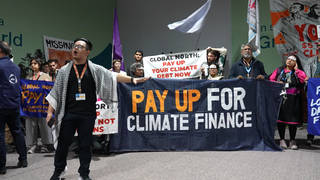
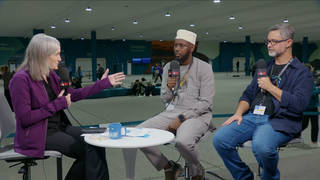
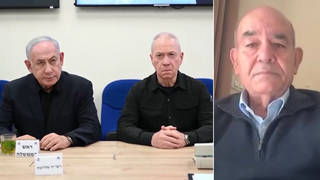
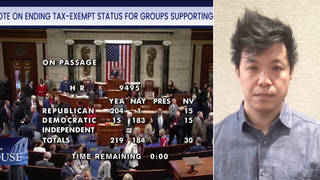





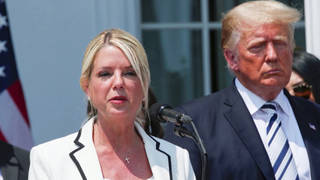
Media Options